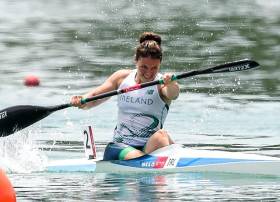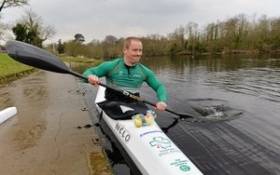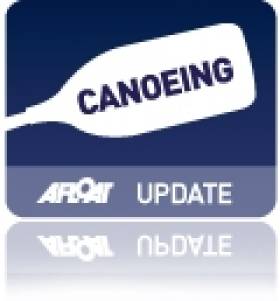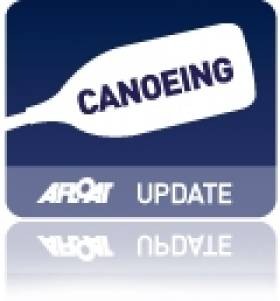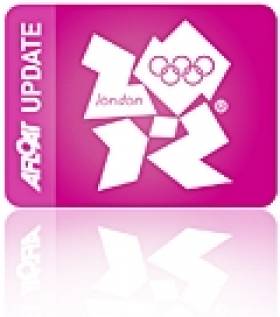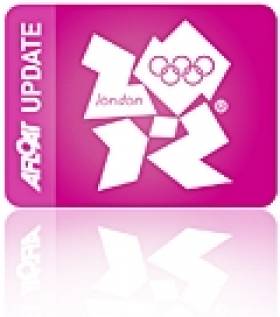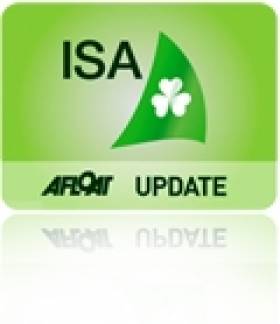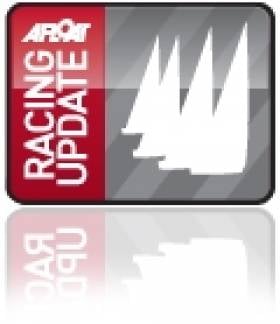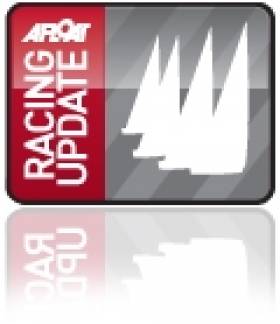Displaying items by tag: O'Leary
Cork's O'Learys Enter Florida's Bacardi Cup in Star & Viper 640 Classes
Brothers Peter and Robert O'Leary sailing under the Baltimore Sailing Club burgee will race their Star keelboat 'Ninky Nonk' in the 95th Bacardi Cup in Florida next week.
Joining them at the Coconut Grove event is their father, Royal Cork ace Anthony and brother Nicholas racing in a Viper 640 with Ben Field.
Over 500 sailors, featuring Olympic and World Champions, from more than 20 nations are expected for the Invitational Regatta that runs from March 6th to 12th.
 Miami Viper – The O'Leary crew of Robert, Anthony and Tom Durcan counted six top ten results in the eight race 2016 Bacardi Sailing Week series on Biscayne Bay
Miami Viper – The O'Leary crew of Robert, Anthony and Tom Durcan counted six top ten results in the eight race 2016 Bacardi Sailing Week series on Biscayne Bay
The O'Leary's are no stranger to Biscayne Bay waters with the Peter and Robert finishing seventh in 2020 with Anthony and Robert previously eighth in the 2016 edition in the Viper class.
O'Leary Ninth in A Final as Egan Misses Out
#Canoeing: Patrick O’Leary finished ninth in the A Final of the KL3 200 metres at the Paracanoe World Championships in Racice in the Czech Republic. The race was won by Serhii Yemelianov of the Ukraine.
Jenny Egan finished eighth in her semi-final of the K1 200 at the Canoe Sprint World Championships, also at Racice. She missed out on an A or B Final place. Egan is set to compete in the K1 5,000 metres on Sunday.
O'Leary Pipped for World Championships A Final Place
#Canoeing: Patrick O’Leary set a new personal best for the second sucessive day, but just missed out on a place in the A Final at the Paracanoe World Championships in Duisburg in Germany this morning. The 43-year-old Irishman finished third in his semi-final of the KL3 200 metres. The top two from the semi-finals and the fastest third place finisher would go through – and O’Leary was pipped by less than seven tenths of a second by France’s Martin Farineaux for this place. Farineaux finished third in the fourth of the four semi-finals. O’Leary qualifies for the B Final.
In the canoe sprint European Olympic Qualifier, Ireland crews qualified for semi-finals through their heats. Michael Fitzsimon finished 4th in the K1 1,000, Jenny Egan fifth in the K1 500 and the K2 200 crew of Tom Brennan and Barry Watkins were sixth.
Paracanoe World Championships, Duisburg (Selected Results; Irish interest):
Men - KL3 200- Heat Four (First Seven to Semi-Final): 2 P O’Leary 42.061. Semi-Final One (First Two and next best time to A Final; 3rd, 4th to B Final): 3 O’Leary 41.722.
Canoe Sprint European Olympic Qualifier, Duisburg, Germany
Men
K1 1,000 – Heat One (Winner to A Final; 2-7 to semi-final; rest out): 4 M Fitzsimon 3:31.693.
K2 200 – Heat One (First Three to A Final; 4-7 to semi-final): 6 T Brennan, B Watkins 34.350.
Women
K1 500 – Heat One (Three to Final; 4-7 to Semi-Final): 5 J Egan 1:55.428.
O'Leary Fourth in World Cup Final in Duisburg
#CANOEING: Ireland’s Pat O’Leary had to settle for fourth at the Canoe Sprint World Cup in Duisburg, Germany today. The paracanoeist qualified for the final of the KL3 on Thursday. Germany’s Tom Kierey won, from Artem Voronkov of Russia and Britain’s Timothy Lodge – who was just .595 of a second ahead of O’Leary, who had also finished fourth at the European Championships earlier this month.
Canoe Sprint World Cup, Duisburg, Germany (Irish interest)
Men
Paracanoeing: KL3 200 – Final: 1 Germany (T Kierey) 41.305, 2 Russia (A Voronkov) 42.247, 3 Britain (T Lodge) 42.891; 4 Ireland (T O’Leary) 43.486.
#CANOEING: Pat O’Leary qualified for the final of the KL3 paracanoeing event at the European Sprint Championships in Racice in the Czech Republic today. O’Leary finished second in his heat of the 200 metre event. Barry Watkins and Michael Fitzsimons finished 2.82 seconds behind the winners, Lithuania, in the semi-final of the K2 1,000. This placed the Ireland crew sixth and ended their campaign as only the top three progressed to the final. Jenny Egan finished sixth in both her heat and semi-final of the K1 500. The top three in the semi-final qualified for the final. Egan is set to compete in the B Final.
European Canoe Sprint Championships, Racice, Czech Republic (Selected Results; Irish interest)
Men
K2 1,000 – Heat One (First Three Directly to Final): 7 M Fitzsimons, B Watkins 3:22.036. Semi-Final (First Three to A Final): 6 M Fitzsimons, B Watkins 3 mins 18.868 secs.
Paracanoe, KL3 200 – Heat Two (First Three Directly to Final): 2 P O’Leary 44.208 secs.
Women
K1 500 – Heat Three: 6 J Egan 1:58.704. Semi-Final (First Three to A Final): 6 J Egan (to B Final) 1:55.076.
Perth Serves up a Tight Finish for O'Leary and Burrows
#PERTH 2011 – Missed opportunities on a crucial day afloat in the Star keelboat means Olympic qualification for Ireland's Peter O'Leary and David Burrows now goes 'to the wire'. Disappointingly, the pair scored a 16th and a 24th today in a fleet of 41 and slip to 15th overall. It follows a black flag result on Tuesday. The top 11 nations will qualify for the Olympics in Perth and although O'Leary/Burrows are in the qualification zone, they will be well aware they occupy the last nation slot. The Cork-Dublin duo have been leapfrogged by the Swiss and now share the same overall score as Spain's Fernando Echavarri and Fernando Rodriquez on 97 points each with only one day of racing left before the medal race on Saturday.
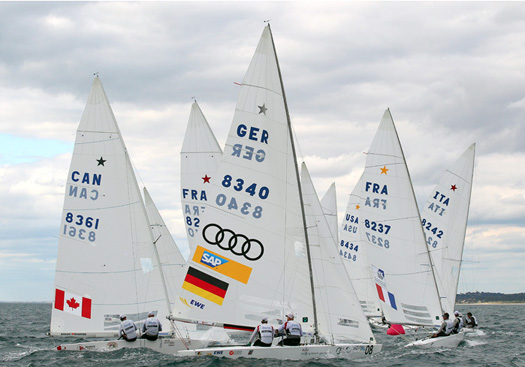
Tight racing in the penulitmate rounds of the Star champs in Perth. Photo: Richard Langdon
The Star class have a rest day tomorrow with their final day of fleet racing taking place on Friday.
Facebook,Twitter Launch for Team O'Leary and Burrows, Website to Follow
The team say they're completing final testing on a new website too. It will be live in the next week or so.
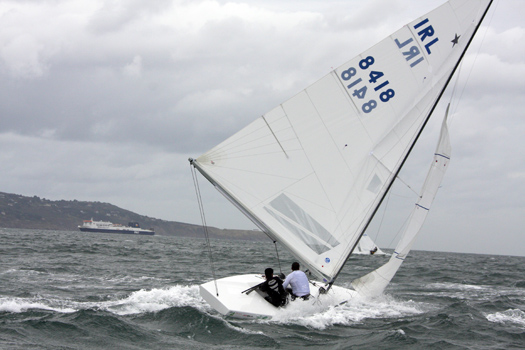
Downwind dazzlers – The Irish Star pair are renowned for their offwind speed
After a string of top results in 2011 the duo are bound for Perth 2012, a regatta where team officials remain confident of a top result.
Follow the Star keelboat duo here on twitter, facebook here and the team website will be here.
O'Leary Exits All Ireland Sailing Regatta
Pre-Regatta favoutite Anthony O'Leary has exited the All Ireland Sailing Championships in the qualfiying rounds. A start line penalty suffered in today's second race of flight two forced him out of the running.
The victorious Commodore's Cup captain, the current Irish Sailor of the Year, who has sailed in the event previously a dozen times and finished as runner-up on three occassions is the shock elimination as the fleet is halved from 16 to eight for tomorrow's final.
The flight two winners, who appear more evenly matched than flight one, were Flor O'Driscoll, Ryan Seaton, Noel Butler and Gordon Patterson.
Results from Flight 2|
Flight |
Boat |
Name |
R1 |
R2 |
R3 |
Total |
|
2 |
3 |
Flor O’Driscoll |
1 |
1 |
3 |
5 |
|
2 |
6 |
Ryan Seaton |
3 |
2 |
2 |
7 |
|
2 |
2 |
Noel Butler |
2 |
3 |
6 |
11 |
|
2 |
5 |
Gordon Patterson |
4 |
4 |
4 |
12 |
|
2 |
7 |
Anthony O’Leary |
5 |
OCS |
1 |
15 |
|
2 |
8 |
Pat O’Neill |
6 |
6 |
5 |
17 |
|
2 |
4 |
Brian Goggin |
8 |
5 |
7 |
20 |
|
2 |
1 |
Alan Henry |
7 |
7 |
8 |
22 |
Eighth Place Overall for O'Leary at New York Invitational Cup
Anthony O'Leary ended up in the same position as he started the New York Yacht Club Invitational Cup after yesterday's final rounds. The Royal Cork crew counted a 15 in the final race to end up eighth, the same as Monday's opening score. The sole Irish invitees were as high as sixth last Thursday.
In a reversal of fortunes from the inaugural event two years ago, the Terry McLaughlin-led team from the Royal Canadian Yacht Club persevered today to win the 2011 New York Yacht Club Invitational Cup presented by Rolex, sailed in Swan 42s. The New York Yacht Club team finished second, with the Annapolis Yacht Club team, third. The final race days' light and shifty conditions gave all 22 teams the opportunity to shift positions on the leaderboard, but in the end most just solidified what they had already earned.
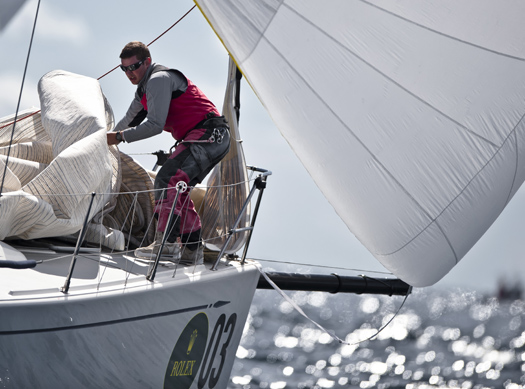
Royal Cork's entry finished eighth in New York. Photo: Kurt Arrigo/Rolex
The Canadian entry, skippered by Olympic medalist and former America's Cup skipper, Terry McLaughlin, went into the day – and the final race – with a ten-point lead over the New York Yacht Club entry. But the Canadians took charge from the start, McLaughlin recounted their strategy, "We decided to go after New York, but it was tricky. It was five knots at the start, but it was very, very shifty and puffy, so if we let them sail their own race and we had tried to sail our own race. There is a reasonable chance that they would have put ten boats between us, so we decided that 'ok listen' we've got to be near them. If we put them back at the start and we're back at the start than it doesn't matter and we couldn't lose.
"But, we still both had reasonable starts at the right end and we went right a little bit. Then they (NYYC) sort of got to us a bit, so I bailed left, but we happened to be in a great puff and gained on them a lot."
The Royal Canadian Yacht Club team, from Toronto, sailed a nearly flawless series with seven top five finishes – out of eleven races sailed. In races where the Canadians were deep in the fleet, McLaughlin, tactician John Togerson and crew inevitably overhauled the boats ahead. McLaughin said, "I think we came back quite well this series. Obviously yesterday was our best, going from nineteenth to sixth. Its important because you can't get off the line in great shape or get around the first mark in great shape, eleven races in a row."
The 55-year old sailor won a silver medal in the Flying Dutchman class in the 1984 Los Angeles Olympics and was the skipper of Canada I in the 1983 America's Cup challenger series. In fact, three of his current crew were holdovers from that Cup campaign. These days his business is importing clothing and footwear from Ireland, and his sailing more relegated to only occasional racing.
In a new addition to the event, the team leading in points at the end of each day flew a "gold" spinnaker in the following day's races. The Royal Canadian team quickly took that honor after the first day and never relinquished it for the week.
McLaughlin was quick to praise his crew, "It was a team effort. I mean, I make the final decisions, but I'm relying on guys that A) make the boat go fast and B) tell me what's going on."
Ken Colburn was skipper of the New York Yacht Club team, the only really viable threat to the Royal Canadian Yacht Club through the five days of racing, coming within five points midweek. Colburn was pleased, "You have to step back from this and say 'we came in second in this regatta to a team that was just doing everything well.' You've got to walk away from that pleased, with just slight disappointment that you didn't get all the way there. The Royal Canadian Yacht Club are the ultimate winner, and they deserve it."
Like many of the teams that only managed to get everyone in the same boat relatively late, the NYYC crew started sailing together for the first time over Labor Day weekend but, according to their skipper, they quickly gelled. Colburn from Marblehead, Massachusetts, was adamant that his crew was equally responsible for their success, "This is a team sport and I'm only driving the boat most of the time. I need tacticians and trimmers and strategists and bow people to do their jobs well, and they all did them superbly well. They were sportsmanlike, cordial, competitive, and always working to win, I couldn't be more proud of this team."
Peter McChesney, skipper of the Annapolis Yacht Club team which finished third, summed up what many competitors agreed, "It was certainly, arguably, the most unique, special, exciting regatta. The professional circuits, and Olympic campaigns, and lot of great one-design classes, but certainly this is a new unbelievable regatta with worldwide excitement."
While the North American teams dominated the top five overall positions, with Eastern Yacht Club, and Newport Harbor Yacht Club in fourth and fifth, the first international entry was the sixth-placed Japan Sailing Federation, skippered by Makoto Uematsu, followed by the Royal Ocean Racing Club (GBR), Royal Cork Yacht Club (IRL), Royal Hong Kong Yacht Club, and Yacht Club Argentino (ARG), rounding out the top ten finishers.
Following the success of the inaugural event in 2009, Event Chairman John Mendez and his Invitational Cup committee set to make several changes to improve the competition. Among these were changing to an all-amateur event, and on-the-water umpiring, both of which were unanimously well received by the competitors. Peter Shrubb, Chief Umpire from Bermuda, oversaw the ten-umpire team. Shrubb was pleased with the results explaining, "We're on the water and adjudicating any rule infractions. We can't catch everything, but we'd like to think we caught 95%. We resolve them on the water, and it saves the competitors having to file protests against each other – it take out of their hands, puts it into our hands and makes for a friendlier, more Corinthian event."
The final Rolex Awards Dinner was held under the marquee on the New York Yacht Club's Harbour Court grounds. Competitors and guests enjoyed dinner and dancing overlooking Newport Harbor.
The Royal Canadian Yacht Club team, overall winner of the Invitational Cup were awarded a Rolex Submariner timepiece and presented the Invitational Cup trophy, which was commissioned by NYYC Commodore Robert James and past NYYC Trustee, Charlie Robertson.
NYYC's Harbour Court hosted 22 yacht clubs – representing 16 nations from six different continents – for the second edition of this biennial event. Racing was conducted in NYYC Swan 42s on Rhode Island Sound and Narragansett Bay from September 10-17, 2011. The next edition of the New York Yacht Club Invitational Cup presented by Rolex will be held in September 2013.
Final Results – 2011 New York Yacht Club Invitational Cup
1) Royal Canadian Yacht Club, Canada, 47 points
2) New York Yacht Club, USA, 67 points
3) Annapolis Yacht Club, USA, 72 points
4) Eastern Yacht Club, USA, 89 points
5) Newport Harbor Yacht Club, USA, 105 points
6) Japan Sailing Federation, Japan, 105 points
7) Royal Ocean Racing Club, Great Britain, 112 points
8) Royal Cork Yacht Club, Ireland, 115 points
9) Royal Hong Kong Yacht Club, Hong Kong, 120 points
10) Yacht Club Argentino, Argentina, 121 points
11) Royal Yacht Squadron, Great Britain, 122 points
12) Nyländska Jaktklubben, Finland, 127 points
13) Cruising Yacht Club of Australia, Australia, 133 points
14) Clube Naval de Cascais, Portugal, 137 points
15) Norddeutscher Regatta Verein, Germany, 138 points
16) Royal Bermuda Yacht Club, Bermuda, 144 points
17) Royal Cape Yacht Club, South Africa, 148 points
18) Itchenor Sailing Club, Great Britain, 150 points
19) Royal Norwegian Yacht Club, Norway, 154 points
20) Yacht Club Capri, Italy, 167 points
21) Real Club Nautico de Barcelona, Spain, 197 points
22) Yacht Club Punta Ala, Italy, 220 points
Royal Cork Move up to Seventh in New York
Royal Cork Yacht Club is seventh overall after scoring an impressive third place in yesterday's race nine of the New York Invitational Cup. The Anthony O'Leary skippered yacht moved from tenth to seventh after scores of 3 and 12 in the penultimate day of the competition yesterday. The Crosshaven crew is five points behind sixth place Japan, a team that have consistently held an advantage over the Irish crew this week.
The New York Chamber of Commerce could not have arranged a more spectacular day for the 22 competing yacht club teams, representing 16 nations from six continents, than what was delivered today after a cold front that passed through the area overnight left behind a classic New England fall day to tantalize competitors at the 2011 New York Yacht Club Invitational Cup presented by Rolex. And after sailing eight races over three days on courses set north of Newport's Pell Bridge, with the breeze from the north-northwest, and an ebb tide, the race committee made the decision to send the competitors out of the now-familiar Narragansett Bay to Rhode Island Sound for two races on the penultimate day of the series.
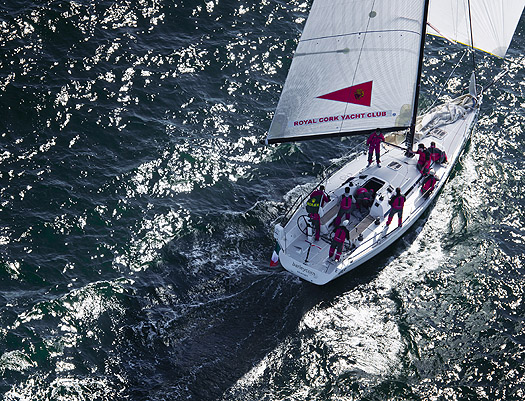
Royal Cork YC's entry in the New York Cup skippered by Anthony O'Leary with tactics from son Nicholas Photo: Rolex/Kurt Arrigo
Remarkably, the first race of the day saw yet another yacht club team winning a race. Eastern Yacht Club became the ninth race winner, in nine races, when they took over the lead early in the race and held it all the way to the finish line.
"It was a good one," said Bill Lynn, helm of the Eastern Yacht Club team of the race as he explained that the EYC sailors liked the conditions today. "I think we're fast , but I don't think we're the fastest boat here, so I think getting out into some shifty, variable breeze with not perfectly flat water, suits our style in these boats a little better. We finally got a great start, which is kind of nice. It was probably our best start of the series so far, and then we just were patient. When we came off the windward end [of the starting line] and tacked onto port there were an awful lot of boats on port way up inside us. It looked grim there for a while. But we were going to stick to our guns and wait it out. And we did, and the righty finally came in at the end and got us around the mark in third and then after that it was playing the shifts [to stay at the top]."
When Lynn's team got through the first gate, they split with the Royal Yacht Squadron. "Fortunately we sent them around the wrong gate and we went around the right gate. When the breeze shifted back left we were crossing them. After we went through the gate and started going back upwind it got super windy, our gage was showing low 20s, and it stayed that way for the rest of the race. When it [the breeze] came smoking back in half-way through, that wasn't in anybody's forecast."
Lynn went on to explain that in a northwest breeze, you have to sail your own race and not worry too much about the other boats. "You almost have to pretend there are no other boats on the course. It's not about winning every race in a northwester, its about not blowing one." For race two, Lynn characterized Eastern's start as good, but in the wrong place on the line. They would go on to finish sixth, and now have 82 points on the scoreboard to stand fifth overall, while tied on points with Newport Harbor Yacht Club which is currently fourth.
For the second day in a row, the final race of the day has been won by the Clube Naval de Cascais (CNC) from Portugal, making them the first team in the 10 races to repeat as a winner. At the helm of CNC is Patrick Monteiro de Barros, whose varied sailing resume includes representing his country at the Olympic Games (twice), as well as circumnavigating the globe (twice). CNC placed 21st in the earlier race today, and with 128 points lies 16th overall.
It would certainly seem that the artic air from home brought additional good fortune for Royal Canadian Yacht Club (RCYC), as they maintained their grip on the top-position in the overall standings. With finishes of 6-11 today, they not only have 46 points but also have increased the spread to 10 points over New York Yacht Club which has 56.
Annapolis Yacht Club has moved up to third overall on 68 points after finishing 4-2 today. Tactician John Torgerson compared the flukey conditions the AYC team is used to in Annapolis with what they saw today on Rhode Island Sound. "It was super-shifty for a while and we like that," said Torgerson. "We had a good idea of what we were going to do off the start and we executed it. For the first race it was light at the start. We saw as little as nine [knots] to as much as 22, it was a huge range. You just had to be able to shift gears. We have guys that are really good at figuring it out." AYC's strategy for the final day of racing is to "just go out and sail" and hope that the two teams above and below them take each other out.
The eleventh and final race of the series will be held tomorrow, Saturday, September 17, and is scheduled for 1100. It will be preceded by the fleet parading through Newport harbor at 0900, with competitors leaving NYYC's Harbour Court at approximately 0830. The winner of the 2011 New York Yacht Club Invitational Cup presented by Rolex will be confirmed at the conclusion of racing.


























